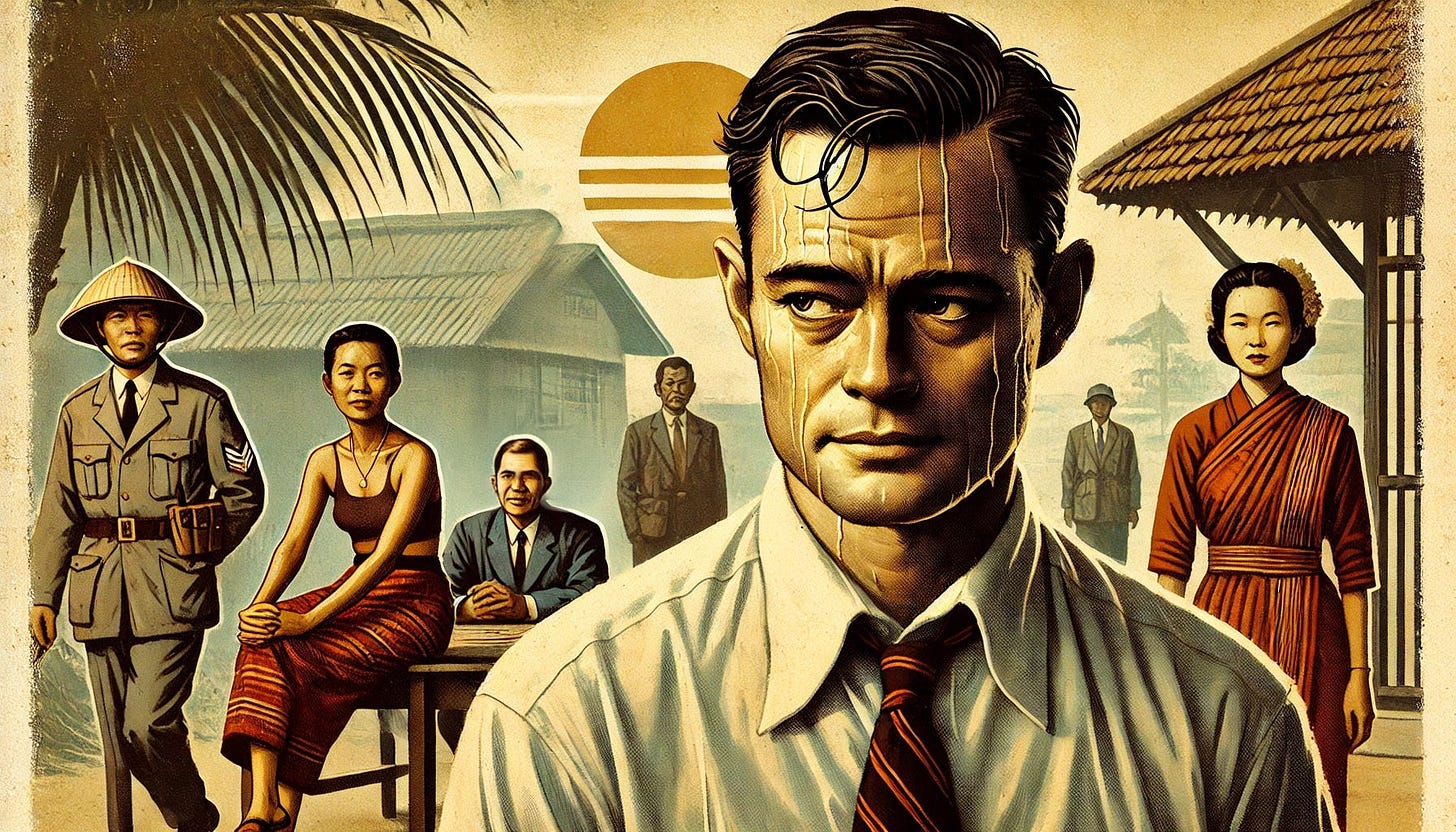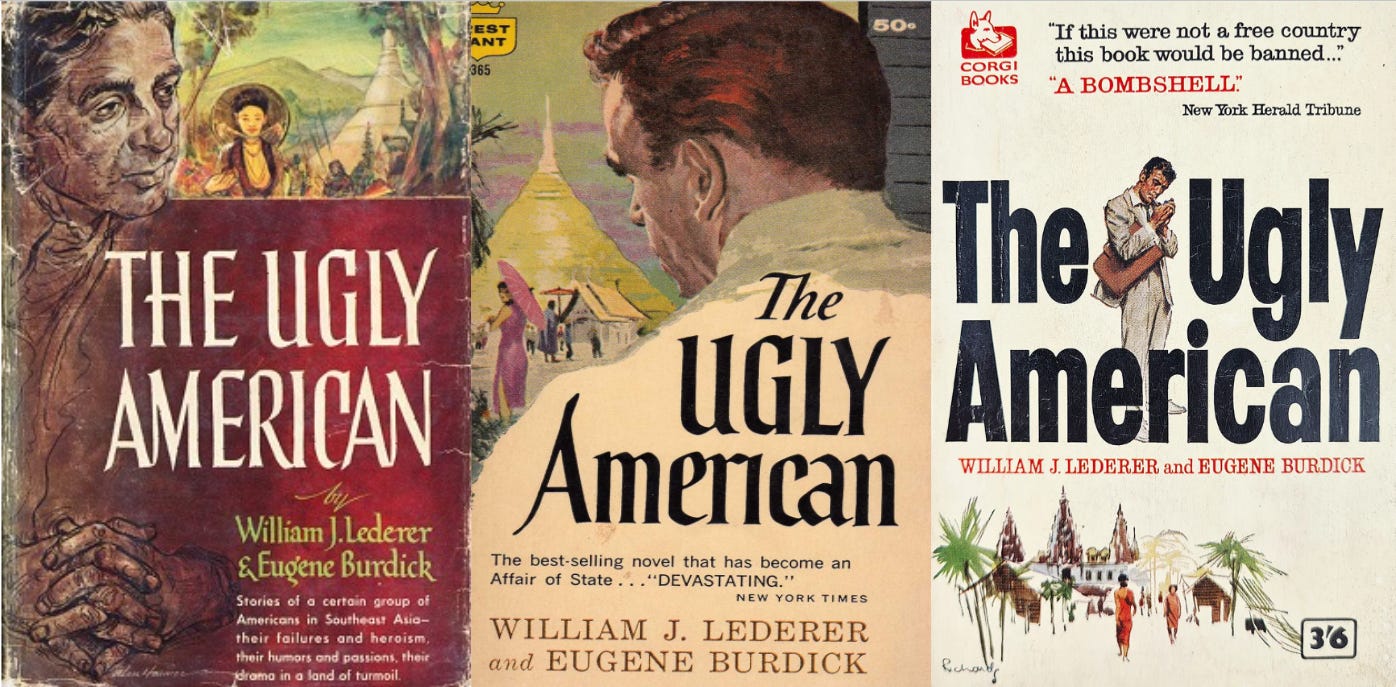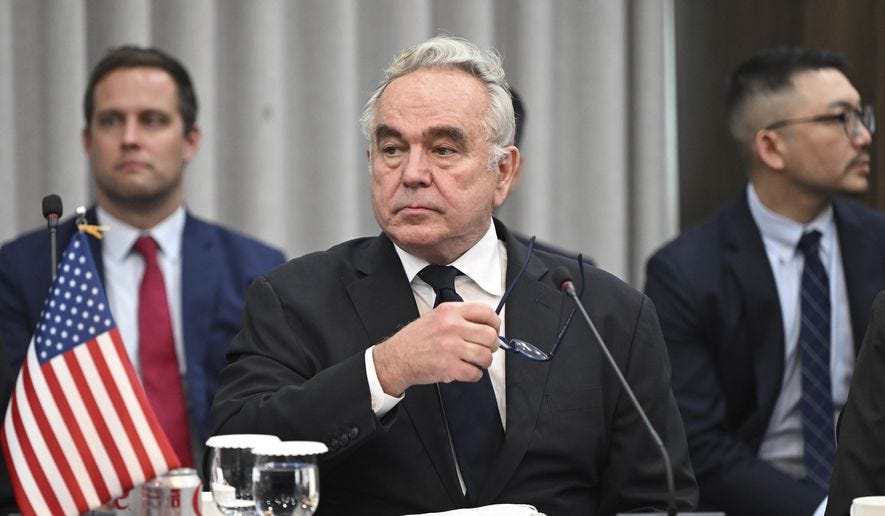"The Ugly American" needs to be re-read with a focus on Korea
Even if you're a supporter, the visuals of pudgy white guys and sinister-looking Japanese guys coming to Seoul to dictate policy is a public diplomacy nightmare!
The Ugly American (1958) by William J. Lederer and Eugene Burdick is a novel, which exposed the failings of U.S. foreign policy through a series of fictionalized stories about American diplomats and their interactions abroad. Though the novel was set in the context of Southeast Asia during the Cold War, its insights into the importance of humility, cultural understanding, and the dangers of arrogance remain relevant today.
The themes in The Ugly American have a particularly striking resonance when considering the U.S. approach to the Korean Peninsula. If the book were written ten years earlier, it would definitely have fitted U.S. policy on Korea. As it is, the lessons of the book seemed to have skipped over generations of diplomats working on Korean affairs. Maybe it’s time for it to be re-read?
The novel tells the story of American officials stationed in the fictional country of Sarkhan, where they engage with the local population ineffectively, failing to grasp the cultural nuances needed to influence change. The titular "Ugly American" refers not to an offensive caricature, but to a modest engineer named Homer Atkins, who works with locals on meaningful, grassroots solutions. His efforts are in stark contrast to those of self-absorbed diplomats and military officers who are blind to local realities.
Lederer and Burdick argue that arrogance and cultural insensitivity undermined U.S. goals abroad, while real progress comes from engaging directly with the people, respecting their traditions, and providing solutions that empower local communities. This lesson is crucial when we examine contemporary U.S. foreign policy on the Korean Peninsula.
On the Korean Peninsula, diplomacy requires a nuanced approach that considers not solely strategy and U.S. interests but also the cultural, historical, and political sensitivities. The failure to do so risks alienating allies and exacerbating tensions with adversaries and friends alike, mirroring the mistakes detailed in The Ugly American.
South Korea, a critical U.S. ally, benefits from the security umbrella provided by American forces stationed on its soil. However, the U.S. focus on security when it comes to Korea strains relations, especially when local perspectives are ignored. There’s a history of protests over environmental damage, noise pollution, and incidents involving U.S. troops. Underneath the surface of these protests was always the sense of ignominy that a proud culture feels having to rely on outsiders for survival - from the Korean War through to today.
Few in the U.S. are aware that this period of relying on outsiders is well over. South Korea is no longer a junior partner in the region. Controlling its capacity in (a) missile range and load, (b) nuclear reprocessing, and (c) foreign policy engagement, is outdated - well outdated.
Even seeking to increase the amount of money South Korea contributes to the maintenance of U.S. troops on the Korean Peninsula is outdated. Trump’s statements calling South Korea a money machine and other calls, rankle every Korean on the ground in Seoul and are a gift to North Korea’s dreams of installing differences and spite into the Korea-U.S relationship.
On the ground here in Seoul, amidst scholars and officials there have even been conversations where increasingly credible arguments are put forward that much like the Mauritians and Diego Garcia, the U.S. should be paying South Korea for the multiple bases on its territory! These bases are after all less and less about defending South Korea from North Korea, and more and more about bringing South Korea into a new Cold War with China. The junior partner, thankful for everything the U.S. deigns to allow it to have or do, is now well outdated!
The Ugly American’s lessons about working with local communities rather than dictating to local communities, resonates in South Korea. Effective diplomacy would involve the U.S. recognizing the concerns of ordinary South Koreans and finding ways to deepen people-to-people exchanges beyond security. Programs that promote cultural exchange, environmental cooperation, and small business development enhances goodwill between the two nations. Much like Homer Atkins’ work in Sarkhan, sustainable solutions on the Korean Peninsula depend on engaging directly with the communities affected by U.S. policy.
There is no better example of poor diplomacy than promoting high level fly-in / fly-out senior officials dictating policy to local officials. Overweight, dandruff-clad foreign officials, who face challenges getting in and out of their chairs, telling fawning local public officials what policies they will follow. It’s the modern version of gunboat diplomacy and the 1871 Ganghwa Expedition. The public doesn’t need to be told “senior officials” of the U.S., Korea and Japan are working together. It’s common sense that they should be, and it’s understood that they are.
With all due respect to the authority of their diplomatic capacity, the visuals of pudgy white guys and sinister-looking Japanese guys coming to Seoul to dictate policy is a public diplomacy nightmare! It’s giving ammunition to extremist voices who want to demonstrate that the Yoon Administration and its supporters are controlled from afar. It’s like it actually is fiction! Whoever thought these were the visuals to be spread on global media knows nothing about Korea’s history, knows nothing about local affairs, and never read The Ugly American!
The Korean Peninsula is also a reminder that U.S. foreign policy cannot operate in a vacuum. South Korea has grown into a dynamic democracy and economic powerhouse, demanding respect as an equal partner. The U.S. increasingly finds itself out of step with the evolving priorities of South Korean leaders and citizens.
Until Yoon, differing approaches to relations with China and North Korea highlight the gap between Washington’s strategic vision and Seoul’s desire for regional stability. Yoon is an aberration and is incredibly unpopular. Korean politics is increasingly polarized. Yoon’s position vis-a-vis the U.S. will not last. Doesn’t anyone in Seoul tell the policymakers in Washington? Washington will need to think deeper on its current policies or it will face a reckoning.
In The Ugly American, American officials’ failure to respect local agency undermined their ability to build lasting partnerships. The same principle applies today: the U.S. must approach South Korea not as a subordinate but as a partner with its own interests and aspirations. Listening to South Korean voices and adapting policies to align with shared goals would foster a stronger alliance.
The U.S. involvement in the Korean Peninsula reflects many of the themes explored in The Ugly American. Arrogance, miscommunication, and a lack of cultural understanding have hampered progress, while moments of humility and cooperation have opened doors for more effective diplomacy. For the U.S. to succeed in the region, it must recognize that military power alone is insufficient. Meaningful engagement requires respecting the agency of South Koreans and building trust from the ground up.
The lessons of The Ugly American remain relevant as the U.S. navigates its relationship with the Korean Peninsula. While military alliances and strategic interests are important, long-term success depends on humility, empathy, and cultural awareness. As Homer Atkins showed in the novel, real influence comes not from imposing solutions but from empowering people through collaboration. Just as in Sarkhan, the key to lasting influence lies in being a good listener, a humble partner, and a respectful neighbor.






